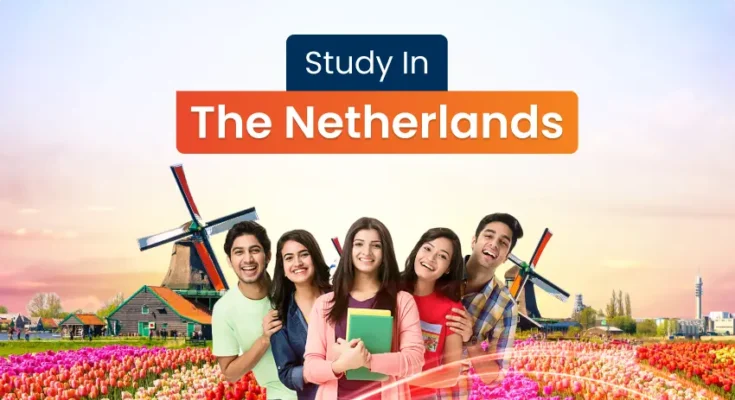Studying in the Netherlands The Netherlands, a small yet vibrant country in Western Europe, has emerged as a top destination for international students seeking high-quality education, cultural diversity, and an innovative academic environment. Known for its progressive society, excellent universities, and widespread use of English in higher education, the Netherlands offers a unique blend of academic rigor and a welcoming atmosphere for global students. This comprehensive guide explores why studying in the Netherlands is an excellent choice, covering key aspects such as the education system, application processes, costs, student life, and practical tips for international students.
Why Choose the Netherlands for Higher Education?
The Netherlands has a long-standing reputation for academic excellence, with a history of producing world-class scholars and researchers. Its universities consistently rank among the top in global rankings, offering a wide range of programs, particularly in fields like engineering, business, social sciences, and environmental studies. According to the QS World University Rankings 2025, institutions like Delft University of Technology, University of Amsterdam, and Utrecht University are among the top 100 globally, showcasing the country’s academic prowess.
One of the most compelling reasons to study in the Netherlands is the availability of English-taught programs. With over 2,100 programs offered in English at the bachelor’s, master’s, and PhD levels, the country is a pioneer in providing accessible education for international students. This is particularly appealing for students from non-Dutch-speaking countries, as it eliminates the language barrier while allowing them to immerse themselves in a multilingual environment.
The Dutch education system also emphasizes innovation, critical thinking, and collaboration. Unlike traditional lecture-based models, Dutch universities often adopt a problem-based learning approach, encouraging students to engage in discussions, group projects, and independent research. This fosters a dynamic learning environment that prepares students for global careers.
Additionally, the Netherlands is known for its open and inclusive culture. The country ranks high on global indices for quality of life, safety, and tolerance, making it an ideal place for students from diverse backgrounds. Its central location in Europe also provides easy access to neighboring countries, offering opportunities for travel and cultural exploration.
The Dutch Higher Education System
The Netherlands has a well-structured higher education system divided into two main types of institutions: research universities and universities of applied sciences.
Research Universities
Research universities, such as the University of Amsterdam, Utrecht University, and Leiden University, focus on theoretical and research-oriented education. These institutions offer bachelor’s, master’s, and PhD programs, with a strong emphasis on academic inquiry and innovation. Programs at research universities are ideal for students interested in pursuing careers in academia, research, or specialized fields like medicine, law, or engineering.
Universities of Applied Sciences
Universities of applied sciences, such as Hogeschool van Amsterdam or Hanze University of Applied Sciences, focus on practical, career-oriented education. These institutions offer bachelor’s and some master’s programs designed to prepare students for specific professions, such as business, hospitality, or design. The curriculum often includes internships and hands-on projects, making it a great choice for students seeking immediate employability.
Program Structure
Bachelor’s programs typically last three years at research universities and four years at universities of applied sciences, while master’s programs range from one to two years. PhD programs are highly individualized and usually take four years to complete. The academic year is divided into two semesters, running from September to June, with some programs offering summer courses.
Admission Requirements and Application Process
Admission requirements vary depending on the institution, program, and level of study. However, there are some common criteria for international students.
Bachelor’s Programs
For bachelor’s programs, applicants typically need a high school diploma equivalent to the Dutch VWO diploma. Common equivalents include the International Baccalaureate (IB), A-levels, or an American high school diploma with Advanced Placement (AP) courses. Some programs may require specific subjects, such as mathematics or physics for engineering courses.
English proficiency is a key requirement for English-taught programs. Accepted tests include IELTS (minimum score of 6.0–7.0), TOEFL (80–100 iBT), or Cambridge English exams. Some universities may waive this requirement for students from English-speaking countries or those who have completed prior education in English.
Master’s Programs
For master’s programs, applicants need a relevant bachelor’s degree from a recognized institution. Some programs require a minimum GPA, specific coursework, or professional experience. Additional requirements may include a motivation letter, CV, and references. English proficiency tests are also required, with higher score thresholds (e.g., IELTS 6.5–7.5).
Application Process
Most Dutch universities use an online application system, such as Studielink, for both domestic and international students. The process typically involves the following steps:
- Choose a Program: Research programs on university websites or platforms like Studyfinder (www.studyfinder.nl) to find the right fit.
- Check Requirements: Review specific admission criteria, including academic qualifications, language proficiency, and additional documents.
- Submit Application: Apply through Studielink and upload required documents, such as transcripts, test scores, and a motivation letter.
- Pay Application Fee: Some universities charge a non-refundable fee (around €100).
- Await Decision: Processing times vary, but decisions are typically communicated within 4–8 weeks.
Deadlines vary by institution but are generally between January and May for September intake. Some programs offer a second intake in February, though this is less common.
Visa and Residence Permits
Non-EU/EEA students require a student visa (MVV) and/or residence permit to study in the Netherlands. The university usually sponsors the visa application, which is processed through the Dutch Immigration and Naturalisation Service (IND). Requirements include proof of admission, financial sufficiency (approximately €12,000 per year), and health insurance. EU/EEA students do not need a visa but must register with the local municipality upon arrival.
Costs and Funding Options
Tuition Fees
Tuition fees in the Netherlands vary depending on nationality and program level. For EU/EEA students, annual tuition for bachelor’s and master’s programs is around €2,314 (2025 rates). Non-EU/EEA students pay higher fees, ranging from €8,000 to €20,000 per year, depending on the program and institution. Specialized programs, such as medicine or MBA courses, may cost more.

Living Expenses
The cost of living in the Netherlands is moderate compared to other Western European countries. On average, students need €800–€1,200 per month to cover accommodation, food, transport, and other expenses. Major cities like Amsterdam and Utrecht are more expensive, while smaller cities like Groningen or Nijmegen are more affordable.
Scholarships and Financial Aid
The Netherlands offers several scholarships for international students:
- Holland Scholarship: A €5,000 one-time grant for non-EU/EEA students, funded by the Dutch government and universities.
- Orange Tulip Scholarship: Aimed at students from specific countries (e.g., China, India, Brazil), offering partial or full tuition waivers.
- University-Specific Scholarships: Many institutions, such as Delft University of Technology or Erasmus University Rotterdam, offer merit-based scholarships.
- Erasmus+: EU/EEA students can apply for funding for exchange programs or joint master’s degrees.
Students can also explore government loans or part-time work (up to 16 hours per week for non-EU/EEA students) to offset costs. The Dutch government requires non-EU/EEA students to prove financial sufficiency for visa purposes, so planning ahead is essential.
Student Life in the Netherlands
Accommodation
Finding accommodation is a key consideration for international students. Options include:
- University Housing: Many universities offer student residences, particularly for first-year international students. These are affordable ( €400–€800 per month) but limited in availability.
- Private Rentals: Renting a room or apartment in the private market costs €500–€1,200 per month, depending on the city.
- Shared Housing: Sharing a house with other students is common and cost-effective.
Students should start their housing search early, as demand is high, especially in cities like Amsterdam and Utrecht. Websites like Kamernet or HousingAnywhere are useful for finding private rentals.
Transportation
The Netherlands is renowned for its cycling culture, and most students use bicycles for daily commuting. A second-hand bike costs €50–€150, and cities are equipped with extensive bike lanes. Public transport, including trains, buses, and trams, is efficient and student-friendly, with discounts available through an OV-chipkaart (public transport card).
Culture and Social Life
The Netherlands offers a vibrant student life with numerous cultural, social, and recreational activities. Most universities have student associations that organize events, sports clubs, and cultural outings. Cities like Amsterdam, Rotterdam, and The Hague are cultural hubs with museums, festivals, and nightlife, while smaller towns like Leiden or Groningen offer a cozy, community-oriented atmosphere.
The Dutch are known for their direct communication style and openness, which makes it easy for international students to integrate. Many universities also have international student organizations, such as Erasmus Student Network (ESN), that help newcomers connect and settle in.
Work Opportunities
Non-EU/EEA students can work part-time (up to 16 hours per week) or full-time during summer months, provided they obtain a work permit. EU/EEA students face no work restrictions. Popular part-time jobs include roles in hospitality, retail, or tutoring. After graduation, non-EU/EEA students can apply for a one-year “orientation year” residence permit to seek employment in the Netherlands.
Practical Tips for International Students
- Learn Basic Dutch: While English is widely spoken, learning basic Dutch can enhance your experience and help with daily interactions.
- Budget Wisely: Create a monthly budget to manage expenses, and take advantage of student discounts on transport, museums, and restaurants.
- Join Student Networks: Engage with international student groups to build a support system and make friends.
- Explore the Country: Take advantage of the Netherlands’ compact size to visit cities like Haarlem, Maastricht, or Rotterdam.
- Stay Organized: Keep track of visa requirements, registration deadlines, and academic schedules to avoid last-minute stress.
Challenges and How to Overcome Them
While studying in the Netherlands is rewarding, international students may face challenges such as:
- Housing Shortages: Start your housing search early and consider smaller cities for more affordable options.
- Cultural Adjustment: The Dutch direct communication style may feel blunt. Embrace it as a cultural difference and ask for clarification when needed.
- Academic Demands: The problem-based learning approach requires self-discipline. Stay proactive and seek support from professors or study advisors.
Final Words
Studying in the Netherlands offers international students a unique opportunity to gain a world-class education in a progressive, multicultural environment. With its diverse programs, English-taught courses, and vibrant student life, the country is an ideal destination for those seeking academic and personal growth. By understanding the application process, costs, and cultural nuances, global students can make the most of their Dutch experience. Whether you’re drawn to the innovative academic system, the cycling culture, or the chance to explore Europe, the Netherlands is a gateway to a transformative educational journey.



